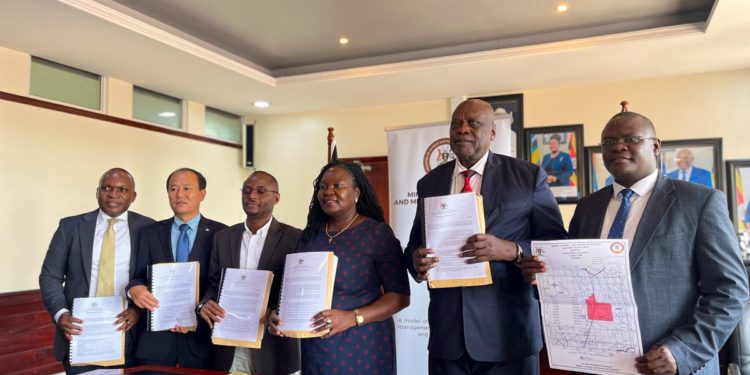By CHIMPREPORTS
The Ugandan government has granted a 21-year Large-Scale Mining License LML0344 to Chinese-backed firm, Sunbird Resources.
The licence, which Energy Minister Ruth Nankabirwa said marks a “pivotal moment in Uganda’s mining sector”, empowers the Chinese firm to mine 8,000 tonnes per day of vital limestone at Rupa Sub-county in Moroto.
Sunbird Resources Ltd recently partnered with West International Holdings Ltd, a subsidiary of Hong Kong-listed West China Cement Ltd, to establish a $1.2bn factory to produce 6,000 tonnes of clinker lime per day and 1 million tonnes of cement in Moroto.
“This monumental project is set to generate substantial employment opportunities, with 600 direct and 3000 indirect jobs, contributing to the economic development of Uganda,” said Nankabirwa while handing over the licence to Sunbird Resources in Kampala on Thursday..
“The mining activities and subsequent cement production are estimated to result in royalty payments exceeding Shs 160m per day of operation, contributing significantly to the consolidated fund,” she added. This translates to Shs 58bn per year.
Over six years of exploration has revealed an impressive 67 million tonnes of clinkerable limestone, positioning Uganda as a key player in cement production.
Upon completion, the cement factory aspires to be the largest in Uganda, striving for import substitution by reducing reliance on the import of 2.4 million tonnes of clinker annually, valued at over $700 million USD.

Locals
However, Nankabirwa did not shed light on how the people of Karamoja region will benefit from the factory and measures put in place to protect the region from the negative effects of mining such as pollution.
President Museveni laid the foundation for the cement factory in September last year.
Museveni noted that since all the people of Karamoja cannot work in the cement factory, they can create business streams that can help them to also make money from the factory indirectly.
“All of you cannot come here to work in the factory but the workers in the factory don’t come with their own gardens yet they need food, they need milk, they need beef and others, that is how all other Karimojongs can come in,” he explained.
“These factories, which are beginning to come, will gather a big population that will need to be fed so you will share the money of the factory through selling food to them. Are you willing to take that money, or do you want it to be taken by others? This is how the economy grows,” he added.
The residents of Rupa in Moroto recenttly formed a Trust.
The Chinese firm has since delivered a range of benefits to the locals including scholarships, a health centre and ambulance under its Corporate Social Responsibility plan.
Museveni advised that, “there are two more ways that the community can be involved like in the case of Amuru Sugar. We got shares for the community in the factory of sugar which is going to be built there or if the government wants to give the investor land for free to attract them, the government can compensate you (locals) with money.”
Karamoja is rich in minerals such as limestone, marble, gold, and government is also looking at petroleum in the Kadam valley.








Discussion about this post